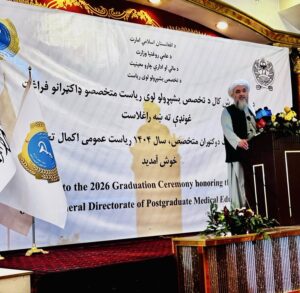KABUL (SW) – Young Afghan women are taking on the role of breadwinners by embroidering and balancing household duties with their small businesses.
Despite the challenges they face, including financial hardship and mental strain from being confined at home all day, embroidery has also become a cherished escape for these women and girls.
Residing in Kabul, 22-year-old Basira Sarwari, a mother of three, financially supports her children and contributes to paying off her husband’s debts, as his income is insufficient. Living apart from her husband, who works as a guard in a factory and can only visit once a week, Basira turns to embroidery to make ends meet.
Like many other young Afghan girls in similar situations, she juggles the demands of running a household and a small business inside her home, which can take a toll on her mental health. Despite struggling to afford medication for her own mental health issues, Basira prioritizes providing for her children, stating, “I do not want to waste my money on myself. I want to spend it on my children.”
The relentless work and stress have aged Basira prematurely, but she persists in working day and night to support her family. She shares, “Even though I am 22 years old, I look like 30 years old by appearance.”
Restrictions in Afghanistan result in women facing struggles such as being banned from secondary school, entering amusement parks, public baths, gyms, and sports clubs, working in NGO offices, holding public office and judicial positions, adhering to a strict dress code, limited travel without a male guardian, feeling invisible, isolated, and suffocated, limited employment opportunities, and banned beauty salons. However, these determined girls and women continue to persevere, showcasing their resilience and determination to provide for their families or to pursue education.
Hasina Kabiri is a school-graduated girl who recently got the certificate with honor, and she is over the moon. She started embroidery as a hobby, not aware that it would turn into a way of life, and her actual dream was to be a doctor, either a dentist or midwife. Even though there is hope for her second dream, midwifery, the low financial condition of her family prevents her from achieving it. She says, “In my village, people do not give value to embroidery, even though abroad people buy them for a thousand or a hundred dollars.”
Sunam is an 18-years-old girl who still has faith on the days when the schools are open and she was taking preparation courses for entrance exams of universities just to be ready even though She was in 10th grade when the Islamic Emirate banned school but now she burned the dream of being a doctor in her heart. Therefore, now that she is busy with embroidery and supports herself, she says, “I was just ten when I lost my father, and it was tough to reach the 10th grade, but I had hope for a brighter future, but now my hopes are burning in front of my eyes.” According to her, embroidery keeps her busy and reduces her stress.
Wahida Wahaj, 42, is responsible for one of the local organizations called Handicrafts and Tailoring of Professional Women of the Galaxy in Fayzabad, Badakhshan province. She has been working for this organization since 1972, Wahida is also a provider for her family and has an empathy for girls in Afghanistan that is why she gives them opportunity to work and make money through tailory and embroidery.
At the time of the republican regime in Afghanistan, Wahida was working with over 100 girls, but now there are only 20 due to a lack of orders and sales. In the past, they were supported by foreign organizations, while now there is no financial support.
20-year-old and school graduate Marina faces a challenging reality. Despite her dream of studying Dari literature and becoming a writer, she finds herself engaged in tailoring and embroidery in the Handicrafts and Sewing Women’s Association in Fayzabad, Badakhshan province to support herself while pursuing her education in midwifery, as private nursing and midwifery universities are currently the only options available for girls in Afghanistan due to the shut-down of education for all girls above 6th grade.
Marina dreams of writing books that will be translated into other languages, but circumstances have forced her to adapt her aspirations. The closure of schools and universities for girls, compounded by the challenges of the pandemic, has led Marina to shift her focus to studying midwifery. She acknowledges the difficulties facing Afghan women and recognizes the need to prioritize her responsibilities as a girl over her personal dreams, stating, “I am a girl, and I know that it is a hard time for Afghan women, and it is time for me to put my unachievable dream aside and put my duty to care about other women as a girl forward.”
Additionally, Marina’s work in tailoring and embroidery not only helps her pay for her education but also to support her family. She also suffers from the stress and pressure of life for Afghan girls due to restriction of education. Despite of these obstacles, Marina says she remains determined to succeed and make a difference in her life for other Afghan girls.
The money that Marina gets is nothing compared to how much effort she puts into her work. She does tailoring for 100–250 Afghanis and 1000–2500 for embroidery. Marina says that while doing tailoring and embroidery, “I go to a thought and recall my dream of being a writer, and I can’t even write my own feelings because I have somehow lost hope and desire to write”.
In a country where opportunities for women and girls are limited, these girls are breaking barriers and paving the way for a brighter tomorrow.
Freshta is a 26-year-old, mother of three children, and she is working with the support of Wahida Wahaj, the head of Handicrafts and Sewing Women’s Association in Fayzabad. She started embroidery to get rid of stress at home. “Being always at home made me stressed, and I started to throw all of my anger on my children,” she said.
Freshta also had a big dream like other girls in Afghanistan and her dream was to be a doctor, but financial issues and restrictions on women did not allow her to be one. However, she says, “I will make sure my children achieve what they want to be.”
Despite our efforts to seek comment from a de-facto authorities (the Spokesperson of the Ministry of Commerce and Industry), we were unable to secure a response on this matter and their plans for women in the industry.






